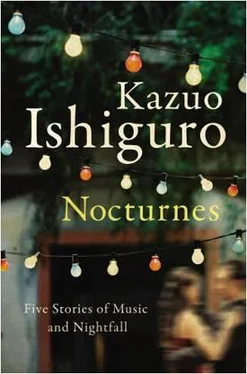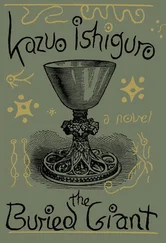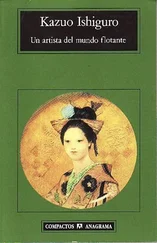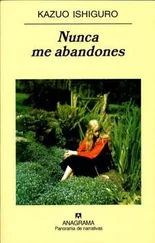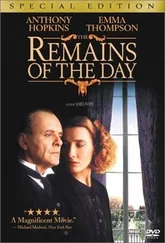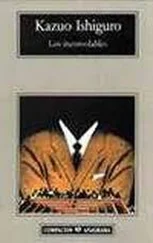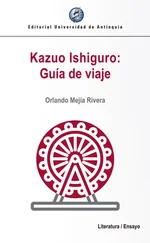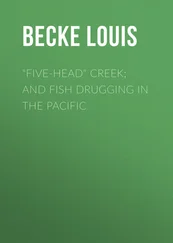“That doesn’t sound like us,” she said, shaking her head. As usual, she was sitting in profile to him in front of the big windows. “The rest of what you played was good. All the rest of it, that was us. But that passage there…” She did a little shudder.
He played it again, differently, though not at all sure what he was aiming for, and wasn’t surprised to see her shake her head again.
“I’m sorry,” he said. “You must express yourself more clearly. I do not understand this ‘not us.’”
“You mean you want me to play it myself? Is that what you’re saying?”
She’d spoken calmly, but as she now turned to face him, he was aware of a tension descending on them. She was looking at him steadily, almost challengingly, waiting for his answer.
Eventually he said: “No, I’ll try again.”
“But you’re wondering why I don’t just play it myself, aren’t you? Borrow your instrument and demonstrate what I mean.”
“No…” He shook his head with what he hoped looked like nonchalance. “No. I think it works well, what we’ve always done. You suggest verbally, then I play. That way, it’s not like I copy, copy, copy. Your words open windows for me. If you played yourself, the windows would not open. I’d only copy.”
She considered this, then said: “You’re probably right. Okay, I’ll try and express myself a little better.”
And for the next few minutes she talked-about the distinction between epilogues and bridging passages. Then when he played those bars once more, she smiled and nodded approvingly.
But from that little exchange on, something shadowy had entered their afternoons. Perhaps it had been there all along, but now it was out of the bottle and hovered between them. Another time, when they were sitting in the piazza, he’d been telling her the story of how the previous owner of his cello had come by it in the Soviet Union days by bartering several pairs of American jeans. When he’d finished the story, she looked at him with a curious half-smile and said:
“It’s a good instrument. It has a fine voice. But since I’ve never so much as touched it, I can’t really judge it.”
He knew then she was again moving towards that territory, and he quickly looked away, saying:
“For someone of your stature, it would not be an adequate instrument. Even for me, now, it is barely adequate.”
He found he could no longer relax during a conversation with her for fear she would hijack it and bring it back onto this territory. Even during their most enjoyable exchanges, a part of his mind would have to remain on guard, ready to shut her off if she found yet another opening. Even so, he couldn’t divert her every time, and he’d simply pretend not to hear when she said things like: “Oh, it would be so much easier if I could just play it for you!”
TOWARDS THE END OF SEPTEMBER-there was now a chill in the breeze-Giancarlo received a phone call from Mr. Kaufmann in Amsterdam; there was a vacancy for a cellist in a small chamber group at a five-star hotel in the centre of the city. The group played in a minstrels’ gallery overlooking the dining room four evenings a week, and the musicians also had other “light, non-musical duties” elsewhere in the hotel. Board and accommodation terms were available. Mr. Kaufmann had immediately remembered Tibor and the post was being held open for him. We gave Tibor the news straight away-in the cafe the very evening of Mr. Kaufmann’s call-and I think we were all taken aback by the coolness of Tibor’s response. It was certainly a contrast to his attitude earlier in the summer, when we’d fixed up his “audition” with Mr. Kaufmann. Giancarlo, in particular, became very angry.
“So what is it you have to think over so carefully?” he demanded of the boy. “What were you expecting? Carnegie Hall?”
“I’m not ungrateful. Nevertheless, I must give this matter some thought. To play for people while they chat and eat. And these other hotel duties. Is this really suitable for someone like me?”
Giancarlo always lost his temper too quickly, and now the rest of us had to stop him from grabbing Tibor by his jacket and shouting into his face. Some of us even felt obliged to take the boy’s side, pointing out it was his life, after all, and that he was under no obligation to take any job he was uncomfortable with. Things eventually calmed down, and Tibor then began to agree the job had some good points if viewed as a temporary measure. And our city, he pointed out rather insensitively, would become a backwater once the tourist season was over. Amsterdam at least was a cultural centre.
“I’ll give this matter careful thought,” he said in the end. “Perhaps you will kindly tell Mr. Kaufmann I will give him my decision within three days.”
Giancarlo was hardly satisfied by this-he’d expected fawning gratitude, after all-but he went off all the same to call back Mr. Kaufmann. During the whole of this discussion that evening, Eloise McCormack had not been mentioned, but it was clear to us all her influence was behind everything Tibor had been saying.
“That woman’s turned him into an arrogant little shit,” Ernesto said after Tibor had left. “Let him take that attitude with him to Amsterdam. He’ll soon get a few corners knocked off him.”
TIBOR HAD NEVER TOLD Eloise about his audition with Mr. Kaufmann. He’d been on the verge of doing so many times, but had always drawn back, and the deeper their friendship had grown, the more it seemed a betrayal that he’d ever agreed to such a thing. So naturally Tibor felt no inclination to consult Eloise about these latest developments, or even allow her any inkling of them. But he’d never been good at concealment, and this decision to keep a secret from her had unexpected results.
It was unusually warm that afternoon. He’d come to the hotel as usual, and begun to play for her some new pieces he’d been preparing. But after barely three minutes, she made him stop, saying:
“There’s something wrong. I thought it when you first came in. I know you so well now, Tibor, I could tell, almost from the way you knocked on the door. Now I’ve heard you play, I know for certain. It’s useless, you can’t hide it from me.”
He was in some dismay, and lowering his bow, was about to make a clean breast of everything, when she put up her hand and said:
“This is something we can’t keep running away from. You always try to avoid it, but it’s no use. I want to discuss it. The whole of this past week, I’ve been wanting to discuss it.”
“Really?” He looked at her in astonishment.
“Yes,” she said, and moved her chair so that for the first time she was directly facing him. “I never intended to deceive you, Tibor. These last few weeks, they haven’t been the easiest for me, and you’ve been such a dear friend. I’d so hate it if you thought I ever meant to play some cheap trick on you. No, please, don’t try and stop me this time. I want to say this. If you gave me that cello right now and asked me to play, I’d have to say no, I can’t do it. Not because the instrument isn’t good enough, nothing like that. But if you’re now thinking I’m a fake, that I’ve somehow pretended to be something I’m not, then I want to tell you you’re mistaken. Look at everything we’ve achieved together. Isn’t that proof enough I’m no fake anything? Yes, I told you I was a virtuoso. Well, let me explain what I meant by that. What I meant was that I was born with a very special gift, just as you were. You and me, we have something most other cellists will never have, no matter how hard they practise. I was able to recognise it in you, the moment I first heard you in that church. And in some way, you must have recognised it in me too. That’s why you decided to come to this hotel that first time.
Читать дальше
